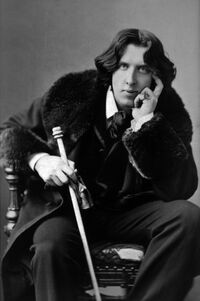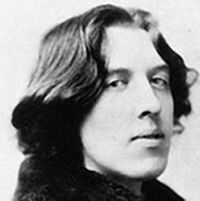
Oscar Wilde, photograph taken in New York in 1882.
Oscar Fingal O'Flahertie Wills Wilde (October 16, 1854 - November 30, 1900) was an Irish writer who wrote in English and French and spent most of his working life in London. Wilde was one of the most famous people of his time, well known not only for his writings but also for his sparkling conversation, biting wit and the flamboyant manner in which he dressed. Oscar Wilde is best known today as a playwright, his most famous play being the comedy The Importance of Being Earnest. However, during his writing career Wilde also wrote poetry, essays, a novel (The Picture of Dorian Gray) and short stories for adults and children. Wilde wrote several articles for The Pall Mall Gazette and other London newspapers and was the editor of The Woman's World magazine.
In 1895, while Wilde was at the height of his success and fame and The Importance of Being Earnest was still being performed on the London stage, he was arrested on charges of gross indecency. Wilde was found guilty of gross indecency and homosexuality (a criminal offense in Britain at the time) and sentenced to two years hard labor. After his release from prison, Wilde went into exile in France and spent the remaining few years of his life in ill-health and poverty.
Biography
Oscar Wilde was born in Dublin to intellectual parents. His father Sir William Wilde was Ireland's leading eye and ear surgeon and was knighted for his services to medicine. His mother Jane Francesca Wilde was a lifelong supporter of Irish independence and wrote poetry in support of Irish nationhood under the pseudonym Speranza (Italian for hope). Wilde was educated at home until he was nine years old, a German tutor and a French maid taught him their languages which he learnt to speak fluently.
Wilde studied Greek and Latin literature at Trinity College, Dublin and later at Magdalen College, Oxford. After his graduation form Oxford, Wilde moved to London and began his writing career. He eventually found great success with his comic plays.

1882 photograph of Oscar Wilde.
In 1884, Wilde married Constance Lloyd. The couple had two sons; Vyvyan and Cyril.
In 1891, Wilde was introduced to Lord Alfred Douglas, known to his friends as Bosie. Wilde had had homosexual relationships with men in the past but it was Lord Alfred Douglas who introduced him to Victorian England's gay sub-culture and the availability of male prostitutes. Lord Alfred Douglas' father, the Marquess of Queensberry, disapproved of his son's lifestyle and his friendship with Wilde, suspecting that the two were lovers.
On February 18, 1895, the Marquess of Queensberry left a calling card for Wilde at a London private gentleman's club. Written on the back of the card was the message For Oscar Wilde, Posing Somdomite (an incorrect spelling of the word sodomite). Wilde sued the Marquess for libel. However, Queensberry's lawyers persuaded the jury that there had been no libel because Wilde was, in fact, homosexual. The Marquess of Queensberry was found not guilty. Wilde was forced to pay Queensberry's legal fees, which left him bankrupt.
Following his unsuccessful libel case, Wilde was arrested on May 25, 1897 on charges of gross indecency. He was found guilty of gross indecency and homosexuality and sentenced to two years hard labor. Wilde served time in Wandsworth and Pentonville prisons in London and was later transferred to Reading Gaol. While in prison Wilde wrote a letter of fifty thousand words, known as De Profundis to Lord Alfred Douglas. After Wilde was found guilty, his wife Constance changed her surname and that of her children to Holland and left England, settling in Switzerland.
Wilde was released from prison on May 19, 1897. He left England for France and never returned to Britain or Ireland again. In France Wilde wrote the lengthy poem The Ballad of Reading Gaol, originally published under the pseudonym C 33, Wilde's serial number in Reading Gaol. The poem was well received but Wilde failed to make much money from it. Wilde spent his final days in a cheap, dirty hotel in Paris.
Works
Plays
- Vera; or The Nihilists (1880)
- The Duchess of Padua (1883)
- Lady Windemere's Fan (1892)
- A Woman of No Importance (1893)
- Salome (1894), originally written in French in 1891, translated into English by Lord Alfred Douglas
- An Ideal Husband (1895)
- The Importance of Being Earnest (1895)
- A Florentine Tragedy (1908), published posthumously, unfinished
- La Sainte Courtisane (1908), published posthumously, unfinished
Novels
- The Picture of Dorian Gray (1890, revised 1891)
The anonymous gay pornographic novels Teleny, or The Reverse of the Medal (published privately in 1893) and Des Grieux, the Prelude to "Teleny" (published privately in 1895) are widely attributed to Oscar Wilde. It is likely that Wilde was one of several authors who contributed to those works.
Short-story collections

Front cover of a 1920 edition of The Happy Prince and Other Stories.
- The Happy Prince and Other Tales (1888)
- The book contains the following short stories:
- House of Pomegranates (1888)
- The book contains the following short stories:
- Lord Arthur Savile's Crime and Other Stories (1891)
- The book contains the following short stories:
- "Lord Arthur Savile's Crime"
- "The Canterville Ghost"
- "The Sphinx Without a Secret"
- "The Model Millionaire"
- The story "The Portrait of Mr. W.H.", about the person to whom Shakespeare's sonnets are dedicated, was not in the first edition but was added to later ones
- The book contains the following short stories:
Essays
- Intentions (1891)
- The Soul of Man Under Socialism (1891)
- A Few Maxims For the Instruction of the Over Educated (1894)
Volumes of poetry
- Ravenna (1878)
- Poems (1881)
- The Sphinx (1894)
- Poems in Prose (1894)
- The Ballad of Reading Gaol (1898)
